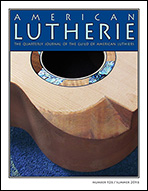 |
|
|||
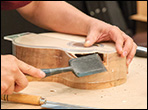 |
Contemporary Ukulele Making: Adding a Beveled Cutaway from his 2014 GAL Convention workshop by Michael DaSilva DaSilva builds the uke body normally, then rips into it with a saw and a big honkin’ chisel. He fits a bent wood gore, then binds it, which is complicated by the changing angle. He demonstrated the whole process live at the 2014 GAL Convention. |
|||
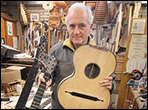 |
Meet the Maker: Sebastián Núñez by Federico Sheppard Sebastián Núñez was a teenager in a Buenos Aires garage band, making electric guitars and pickups and searching for prog rock records, until he followed his girlfriend to the Netherlands to escape the troubles in Argentina. There he fell in with a historic-house-restoring, Harley-riding, early-music luthier. He read every early-music magazine in the Utrecht University library while commuting to work. Now he’s an old master, making and restoring lutes, Romantic guitars, and harpsichords. Our globetrotting reporter Federico Sheppard drops in on his busy workshop. |
|||
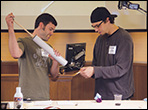 |
Tales from the Soundhole: Guitar Repair Tips and Techniques from their 2014 GAL Convention workshop by Alex Glasser and Brian Michael Brian and Alex are at it again. Here they cover a number of interesting repair projects including crack repair and finish touchup on satin-finished guitars, cracked heel blocks, magnets, steamers, and even using a parked car as a neck heater. |
|||
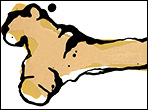 |
How to Prepare Bone by Sean J. Barry So if you did go down to the butcher shop and get a big ol’ cow bone to make saddles and nuts, what would be your next step? Make some soup. No, really. That’s the first step to preparing bone for lutherie use. But it gets less appetizing after that. |
|||
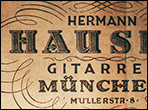 |
GAL Instrument Plan #33, Second Edition: 1937 Hermann Hauser Sr. Classic Guitar, Ex Segovia by R.E. Bruné In 1992, GAL stalwart R.E. Bruné measured and photographed this instrument, which Segovia famously called “the greatest guitar of our epoch” at the Metropolitan Museum of Art in New York. Good ol’ Number 33 has been one of our most popular plans since we first published it twenty-four years ago. Technology has changed for the better since then, and we are delighted to present this new edition featuring color printing and razor-sharp lines. |
|||
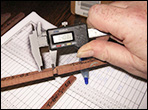 |
Proposed Standard Glue Strength Testing Method by Jim Blilie How strong is glue? Like, is Titebond stonger than hide glue? Aside from forming generalized opinions based on observation or making assumptions based on conventional wisdom, how would you know? Jim Blilie proposes a test method to help us get more organized. It involves breaking a lot of little sticks. |
|||
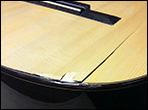 |
Fixing a Smashed Guitar Edge with Antonio Tessarin by Robbie O’Brien Robbie O’Brien keeps up a friendly lutherie competition with his old mentor Antonio Tessarin. Robbie is in Colorado and Antonio is in Brazil, but that’s no prob these days, what with the smartphones and the Interwebs and all that. In this article Antonio shows Robbie how he fixed a nasty smash on the edge of one of his own classical guitars. Sweet! What will Robbie do to one-up that? |
|||
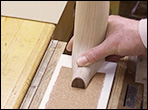 |
Aligning the Bolt-on Butt Neck Joint by R.M. Mottola These simple jigs and techniques will help you quickly and easily get the alignment of a bolt-on guitar neck just right. |
|||
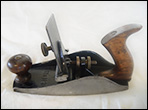 |
Toothed Planes and Scraper Planes by Rick Rubin The same thing that makes crazy grain figure beautiful can make it hard to work with a plane. So use a sander, right? Well, not everyone finds that to be a helpful or welcome suggestion. For them, toothed planes and scraper planes can be the solution. Rubin argues that excellent antique tools are available at reasonable prices and will do the job well. |
|||
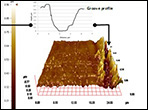 |
Savart Journal: Recent Research by R.M. Mottola RM Mottola works to build bridges of understanding between the luthier’s shop and the egghead’s cubicle. (If the word “math” does not evoke a shuddering fear based on high-school humiliation, check out the Savart Journal, an online research publication hosted by the GAL.) RM describes, in plain English, the contents of two new articles of original research. In the first, high-powered microscopes are used to see if strings really do “wear out” or just get gunked up. In the other, a bunch of spruce samples are carefully finished and tested to see if different types of finish have different effects on acoustic damping. |
|||
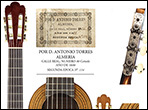 |
Reviews: A Collection of Fine Spanish Guitars from Torres to the Present by Bryan Johanson The second edition of this important book is a considerable advance over the original. |
|||
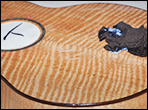 |
Product Reviews: Aqua Coat Clear Wood Grain Filler by Bob Gleason Gleason has been making instruments for a long time and he’s used a lot of different grain fillers. And he has considerable experience with this particular brand. He likes it a lot. |
|||
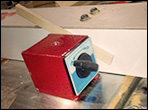 |
It Worked for Me by Todd Rose, John Cross, Jack E. Johnston, and Ed Smith A super easy, accurate, and cheap tool to level one high fret. A work board to run a thin plate through a planer. Making an exact-width slot with a table saw and a lock-down magnet. Steaming herringbone purfling. |
|||
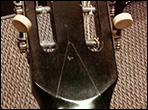 |
Questions edited by R.M. Mottola Should the bottom of a steel string guitar nut be parallel to the fretboard, or to the peghead? Where should the bridge be located relative to the X braces? What is katalox? What can you tell me about this old guitar? |
|||
Web Extras |
||||
| Top of Page | ||||
